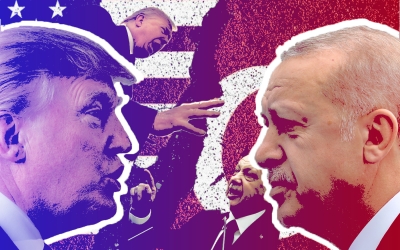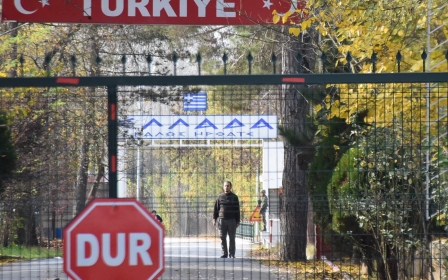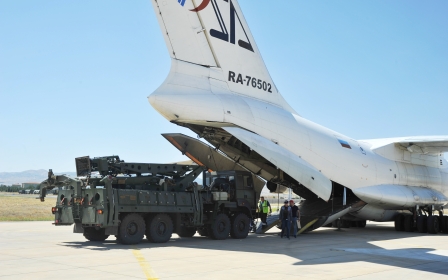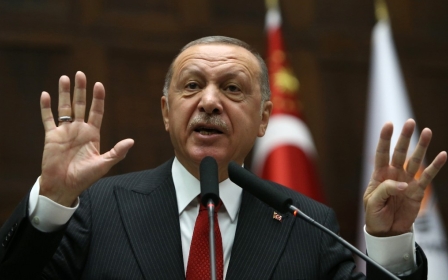Trump hails 'US-Turkish alliance' after contentious meeting with Erdogan
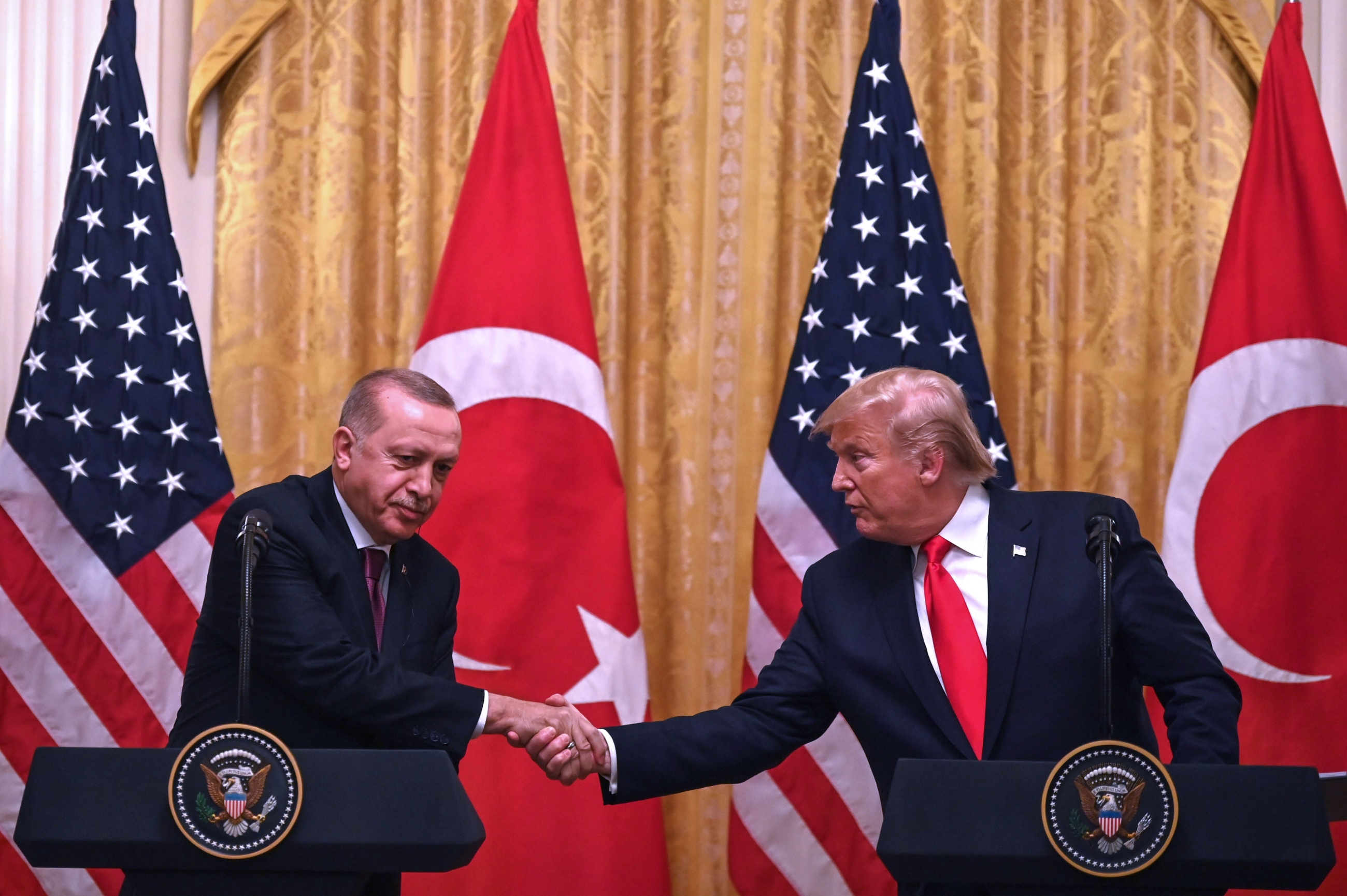
Syria, Russian S-400s and the prospect of American sanctions were only some of the contentious issues on the table on Wednesday as US President Donald Trump met his Turkish counterpart, Recep Tayyip Erdogan, at the White House.
At a news conference on Wednesday afternoon, Trump said he had a "wonderful and very productive meeting" with the Turkish president.
"The US-Turkish alliance can be a powerful force for security and stability, not only in the Middle East but beyond," Trump said.
Trump had resisted calls from members of Congress to cancel the summit, holding bilateral meetings with Erdogan throughout the day.
"Over the course of the day, President Erdogan and I had a frank and productive conversation on a range of issues," Trump added.
New MEE newsletter: Jerusalem Dispatch
Sign up to get the latest insights and analysis on Israel-Palestine, alongside Turkey Unpacked and other MEE newsletters
Trump and Erdogan agreed to increase trade to $100bn during their meeting. "Frankly, we're going to be expanding our trade relationship very significantly," Trump said. "Our economic relationship has tremendous potential."
The Turkish president said that Ankara has been Washington's "most reliable partner" in the fight against the Islamic State (IS) group, and hoped to expand their relations.
"I think we should remain resolved in order to open a new chapter in our relations," Erdogan said at the news conference.
Bipartisan criticism
The meeting between the two leaders came amid increasing criticism in Washington of the Turkish government, particularly over its recent incursion into Syria.
Trump's remarks didn't stop American politicians from criticising Erdogan's visit to the US capital - or human rights groups and religious organisations from protesting outside the White House.
"I hope that everybody here understands that this is not a political issue," Soma Yunis, a medical student, told Middle East Eye at the protest, which drew about 200 people on Wednesday afternoon.
Yunis said she was there to denounce Turkey's recent military campaign in northern Syria, where it pushed out the US-backed, Kurdish-led Syrian Democratic Forces (SDF).
"This is not an, 'I hate Trump' issue. This is not an Erdogan issue ... This is a humanitarian crisis. This is women, children, men, all being uprooted from their lives," Yunis said.
Democratic Senator Bob Menendez, who sits on the Senate Committee on Foreign Affairs, slammed the meeting, saying on Twitter on Wednesday that Trump is welcoming "a known authoritarian, human rights abuser and friend of [Russian President Vladimir] Putin".
Chris Van Hollen, another Democratic senator, said on the floor of the US Senate on Tuesday that the decision to meet Erdogan "has alarmed our allies and comforted our adversaries".
"It's a decision that undermines our values and our national security interests," said Van Hollen.
Last week, a bipartisan group from the US House of Representatives said Erdogan's visit had come at an "inappropriate time" and called on Trump to rescind his invitation.
Simmering tensions
In early November, several top Turkish officials said Erdogan was debating whether he would go to Washington at all.
One sticking point was a recent House resolution that recognised the killings of Armenians during the Ottoman Empire as a genocide, a move that was widely seen as a rebuke to the Turkish government over its incursion into northern Syria to root out US-backed Kurdish fighters there.
Congressional efforts to levy sanctions against Turkey for that military operation in Syria have also contributed to growing frustrations between the Turkish and American governments.
'If Turkey doesn't get rid of the S-400, I mean, there will likely be sanctions. We've made that very clear to President Erdogan'
- Robert O'Brien, Trump's national security adviser on Face the Nation
Two US resolutions are currently under consideration - one in the House, and one in the Senate - that would impose sanctions on Turkey.
The measure passed in the House, while the Senate bill has yet to be voted on.
Trump has not yet spoken publicly about either the sanctions or the Armenian genocide motion.
Erdogan slammed the House genocide resolution, saying it will "cast a deep shadow over bilateral relations".
The US president said on Wednesday that he spoke to Erdogan about another testy topic: Ankara's purchase of the Russian-made S-400 missile defence system.
The US kicked Turkey out of its F-35 fighter jet programme earlier this year, saying the Turkey-Russia deal put US surveillance technologies at risk. Ankara has maintained that the Russian defence system does not threaten its NATO ally.
Five Republican senators, as well as US Secretary of State Mike Pompeo and Commerce Secretary Wilbur Ross attended part of the meeting with Trump and Erdogan on Wednesday.
Speaking about the F-35 programme and the S-400 purchase, Trump said "hopefully we'll be able to resolve this issue".
On Sunday, the US president's national security adviser said in an interview with CBS News' s Face the Nation that "there will likely be sanctions" if Turkey doesn't scrap its deal with Russia for the S-400s.
"We've made that very clear to President Erdogan. There's no place in NATO for the S-400. There's no place in NATO for significant Russian military purchases. That's a message that the president will deliver to him very clearly when he's here in Washington," Robert O'Brien said.
The bilateral meeting did not seem to get much accomplished, according to Marcus Montgomery, a congressional resident fellow at the Arab Center Washington DC.
"I think Erdogan is playing to his domestic audience ... A photo opp looks good during these times, especially when Congress seems fractured regarding the US-Turkish relationship," Montgomery told MEE.
Longstanding allies
Erdogan last visited the US in 2017, when he came to a meeting with Trump with a list of complaints.
These included concerns over US support for Kurdish fighters in Syria and Washington's refusal to extradite Fethullah Gulen, a US-based Turkish cleric Ankara accuses of orchestrating an attempted coup in 2016.
Gulen has denied that allegation.
Despite these longstanding tensions, Trump and Erdogan's relationship has largely remained warm, with both leaders announcing publicly on several occasions that they spoke over the phone to address issues between the countries.
'The US-Turkish alliance can be a powerful force for security and stability, not only in the Middle East but beyond'
- US President Donald Trump
Trump was also one of the first leaders to congratulate Erdogan on winning a referendum vote to strengthen his office in 2017.
However, later that year, the US issued sanctions against Turkey over the detention of a US pastor. Those measures caused the value of the Turkish lira to drop and shook the country's economy.
It remained unclear whether the pair emerged from Wednesday's meeting with any resolutions to the issues at hand.
Turkish Finance Minister Berat Albayrak, who came to Washington as a part of the Turkish delegation, said in a tweet that the discussions had been "fruitful", but didn't go into further detail.
MEE's Sheren Khalel contributed reporting from Washington DC
Middle East Eye delivers independent and unrivalled coverage and analysis of the Middle East, North Africa and beyond. To learn more about republishing this content and the associated fees, please fill out this form. More about MEE can be found here.


